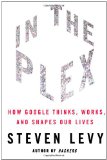“In The Plex” is a book by Steven Levy on Google that attempts to explain the factors behind its rapid growth and spectacular success and what makes it really different from other companies. It differs from the other such books on the company in that the author was granted unprecedented access by the normally-secretive company. This makes the contents of the book fairly accurate and turns it into a great book to read if you are curious about the inner workings of this company.
(Disclosure: I am an employee of Google at the time of this writing, albeit a fairly new one.)
I am still amazed at the extent of the access the author seems to have had in the company over the years that he has been covering it (first for Newsweek, then for Wired and then for this book). He wasn't just able to talk to people at almost all levels and roles in the company, but he was also allowed into the top-level Google Product Strategy (GPS) meetings, internal product-launch and product-review meetings, the weekly “TGIF” all-hands meetings, inside a data-center, an incubation trip for newly-recruited Associate Product Managers (APMs), etc. This is what makes the book so authoritative on the company, though it also calls the objectivity of the author into question. Happily enough the author does not shy from criticizing the company for its missteps and oversights, though the indulgence in a few places is somewhat grating.
Of course, the company has been providing some insights over the years into its workings via research papers, spiel on its web-site, books like The Data Center as a Computer, tech-talks and presentations, etc. Those who have been keenly following the company over the years will therefore find much of the material familiar, though there is surely some new material here especially the behind-the-scenes accounts of crucial periods in the company's history (e.g. the tweaking of search-results to divine user-intent and deliver satisfaction, the creation of the AdWords and AdSense programs, the launch of Google Books and its subsequent tribulations, the launch of the China offices and the pull-out from China later, etc.). The book was therefore particularly interesting and insightful to me, even as an employee working at the company.
Apart from the indulgence towards the company or its founders shown by the author at times, one of the minor irritants in the book for me was his insistence on bringing up the Montessori education of the founders again and again as the reason for their approach to building things and running a company that is so different from their peers elsewhere. There is no concrete evidence provided to make one believe this assertion, so the fixation is a little puzzling for me. As far as I can tell, there is no correlation between Montessori education and audacious creativity of the type shown by the two founders.
The author covers a lot of the important products, but some of the omissions are still a little jarring. For example, News barely merits a brief mention here, while Maps and Orkut are mentioned almost in passing, even though each of them is (or has been) a significant product on its own. News is used by a lot of people to keep up with their world and provides a clutter-free gateway to accessing a lot of newspapers on the Internet. Maps requires a fair amount of manpower and technology to be really useful. Orkut was very popular outside of US, especially in Brazil and India. (Plus was apparently being launched just as the author was wrapping up writing the book - he mentions the war-like effort to launch it in a very short time to catch up with Facebook, but does not cover its differentiating features or subsequent reception.)
Get this book if you want to know how Google works, what it really believes in and what has made it so successful. To know any more than this, you'll have to take up a job there.
